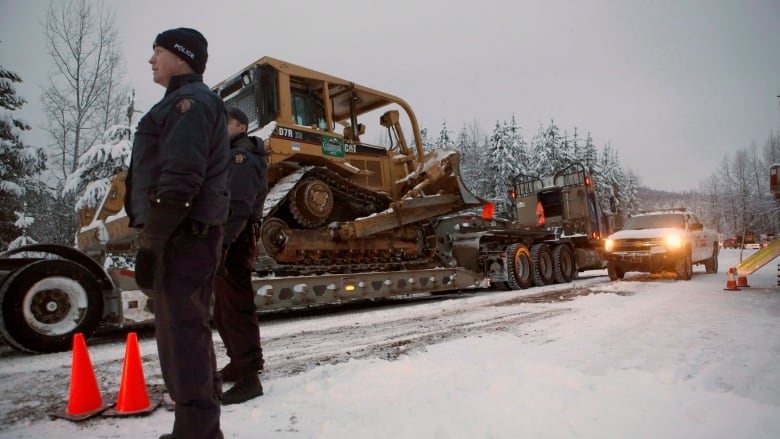UN committee issues 3rd rebuke to B.C. and Canada over policing of Indigenous land defenders
Letter cites escalation in use of force and intimidation of Secwepemcand Wet'suwet'en land defenders

On the heels of a third rebuke of the provincial and federal governmentfrom the UN Committee on the Elimination of Racial Discrimination (CERD), representatives of the Wet'suwet'en and Secwepemc Nations are restating demands to haltconstruction of the Coastal GasLink and Trans Mountain pipelines.
In a letter dated April 29, CERDsaidthe governments of Canada andBritish Columbia "have escalated their use of force, surveillance, and criminalization of land defenders to intimidate, remove and forcibly evict Secwepemcand Wet'suwet'en Nations from their traditional lands..."
The lettergoes on to name the RCMP, the RCMP'sCommunity-IndustryResponse Group(C-IRG) and private security forces as the perpetrators.
"The fact that Canada has a special task forceC-IRG to assure industry free access to our lands and to criminalize us for exercising our rights to our thousands of yearold governance system indicates to the world thatCanada and B.C. maintain an abusive relationship toward Indigenous people," saidSleydo' (Molly Wickham), spokesperson for the Gidim'ten clan of the Wet'suwet'en.
About 5,000 workers in northern B.C. are halfway through the construction of the $6.6-billion Coastal GasLink pipeline project, part of which runs through the territory in dispute. The pipeline is designed to carry fracked natural gasto a $40-billion LNG terminal inKitimat, B.C., for export to Asia.
Coastal GasLinkhas noted the projectis fully authorized and permitted by government and has the support of all 20 elected band councils along the pipeline route.
But Wet'suwet'en hereditary chiefs have opposed the project, sayingband councils do not have authority over land beyond reserve boundaries.

In 2019, hereditary chiefs and supporters began blockading access to Coastal GasLink pipeline worksites,sparking a military-style response from police and a nationwide discussion about who gets a say in resource development on landclaimed as traditional, unceded territory.
The 1,150-kilometreTrans Mountain pipeline expansion projectwill deliver 890,000 barrels of oil a day from Alberta oil sands to Burnaby, B.C., when completed.
Trans Mountain was bought by the federal government for $4.5 billion in 2018. This February it was announcedthe cost of construction had ballooned to$21.4 billion. On Wednesday, Politico reportedthe federal governmenthad recently approved another $10 billion in loan guarantees to attract investment to the project.
CERD previously sent letters in 2019 and 2020 asking B.C. and Canada to refrain from using force againstWet'suwet'en and Secwepemc Nations and to withdraw police and security services from traditional territories.
"What this international governingbody is saying is treat us fair. Treat us fair and look at the facts," said Rueben George of theTsleil Waututh Nation Sacred Trust Initiative.
"This is a warning that [the pipelines] are not good projects in multiple ways, and [are]breaking laws in multiple ways."












_(720p).jpg)


 OFFICIAL HD MUSIC VIDEO.jpg)
.jpg)



























































































